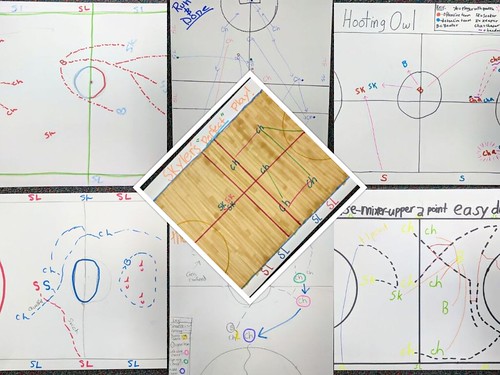 As we shift into Expository/Informational Writing during our school’s season of Quidditch, I use the opportunity to expand the notions of literacy by incorporating the diagramming of a sport play into the classroom. Students must invent a play to be done on the floor of our game of Quidditch (which we play in the gym), and then both diagram out the movement of players and write an expository piece of writing, explaining how the play unfolds.
As we shift into Expository/Informational Writing during our school’s season of Quidditch, I use the opportunity to expand the notions of literacy by incorporating the diagramming of a sport play into the classroom. Students must invent a play to be done on the floor of our game of Quidditch (which we play in the gym), and then both diagram out the movement of players and write an expository piece of writing, explaining how the play unfolds.
This kind of literacy — connecting writing to the athletic field — opens up the doors for some of my students who play sports but who are reluctant to write. They immediately see the connection of clear, sequential writing, and imagine themselves as a coach in a timeout, giving out instructions on the basketball court, or the football or soccer field, with a small whiteboard in hand.
Sports plays are a language all of their own, defined by the sport. Here, for example, in our game, you may not know that CH is chaser, K is keeper, SL is sideline, and SK is seeker. The colored floor lines have meaning, too, to our game. The arrows and dotted lines indicate movement. It’s visual information with a writing companion (with a bit of trickery, since the writing is mostly what I am most after here).
This kind of activity comes from a workshop presentation I was in many years ago now, through the National Writing Project, where a fellow writing project member shared her work in using football play diagrams to teach reading to her struggling high school students. Something clicked when I saw that. It has stayed with me, this idea of meeting the literacy needs of our students on the fields where they play.
In a resource she created for NWP on Redefining Text, Bee Foster writes:
When we expand our view of text, we celebrate and support a greater number of our students on a regular basis. We acknowledge the ways in which our students are already reading and writing. We give them credit for their strengths and begin an important dialogue around the transfer of skills from one mode to another. We more effectively provide differentiation both in what students read, and in what students write. Most importantly, we more regularly allow our struggling students to take on the role of expert.
Hey – I even found her video:
Peace (run it, catch it, win it),
Kevin
I love that your Quidditch tournament happens in March so that each year I am reminded of the wonderment of non-Hogwarts school revelling in the world of fiction turned reality.
There is something to echoes of each year, returning.
Kevin